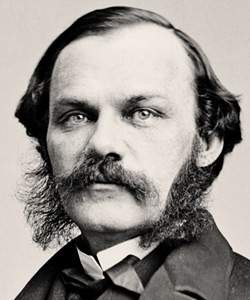Henry Jarvis Raymond (American National Biography)
Scholarship
The [New York] Times printed six days a week until the exigencies of war pushed Raymond into starting a Sunday edition, which he did the week after the Fort Sumter attack. By this time, the Times was one of only three (with the [New York] Herald and [New York]Tribune) eight-page dailies in the country, a remarkable feat for a paper less than a decade old. The Times also was among the leading papers in circulation and news gathering and was widely clipped throughout the era.
Meanwhile, Raymond's political activities continued. Raymond helped to draft the charter of the new Republican party in 1856, and the Times was strongly Republican for the rest of Raymond's life and beyond. In a series of open letters to W. L. Yancey of Alabama right after Lincoln was elected president, Raymond attacked secession and the growing southern belligerency. These letters, along with the debate with Greeley on Fourierism, reflect both Raymond's persistence and his cool, analytical bent. The Times was strongly pro-Union before and during the war; its view on slavery was antiexpansion before the war but shifted to abolitionist after the fighting began. The paper's support for Lincoln was much more consistent than the Tribune's, and the Times became the administration's leading supporter. Raymond's biography of Lincoln, published during the 1864 election year, was widely read.
Meanwhile, Raymond's political activities continued. Raymond helped to draft the charter of the new Republican party in 1856, and the Times was strongly Republican for the rest of Raymond's life and beyond. In a series of open letters to W. L. Yancey of Alabama right after Lincoln was elected president, Raymond attacked secession and the growing southern belligerency. These letters, along with the debate with Greeley on Fourierism, reflect both Raymond's persistence and his cool, analytical bent. The Times was strongly pro-Union before and during the war; its view on slavery was antiexpansion before the war but shifted to abolitionist after the fighting began. The paper's support for Lincoln was much more consistent than the Tribune's, and the Times became the administration's leading supporter. Raymond's biography of Lincoln, published during the 1864 election year, was widely read.
David T. Z. Mindich, "Raymond, Henry Jarvis," American National Biography Online, February 2000, http://www.anb.org/articles/03/03-00412.html.
Henry Jarvis Raymond (Congressional Biographical Directory)
Reference
RAYMOND, Henry Jarvis, a Representative from New York; born in Lima, Livingston County, N.Y., January 24, 1820; attended the common schools; was graduated from the University of Vermont at Burlington in 1840; moved to New York City and studied law; engaged in journalism; was connected with the New York Tribune 1841-1848, with the Courier and Enquirer 1848-1850, and with Harper’s Magazine in 1850; member of the State assembly in 1850 and 1851 and served as speaker in the latter year; established the New York Times in 1851; delegate to the Whig National Convention in 1852; Lieutenant Governor of New York in 1854; declined a renomination; delegate to the Republican National Convention in 1860; again a member of the State assembly in 1862 and served as speaker; elected as a Republican to the Thirty-ninth Congress (March 4, 1865-March 3, 1867); unsuccessful candidate for renomination in 1866; resumed newspaper activities with the New York Times; died in New York City June 18, 1869; interment in Greenwood Cemetery, Brooklyn, N.Y.
“Raymond, Henry Jarvis,” Biographical Directory of the United States Congress, 1774 to Present, http://bioguide.congress.gov/scripts/biodisplay.pl?index=R000084.





